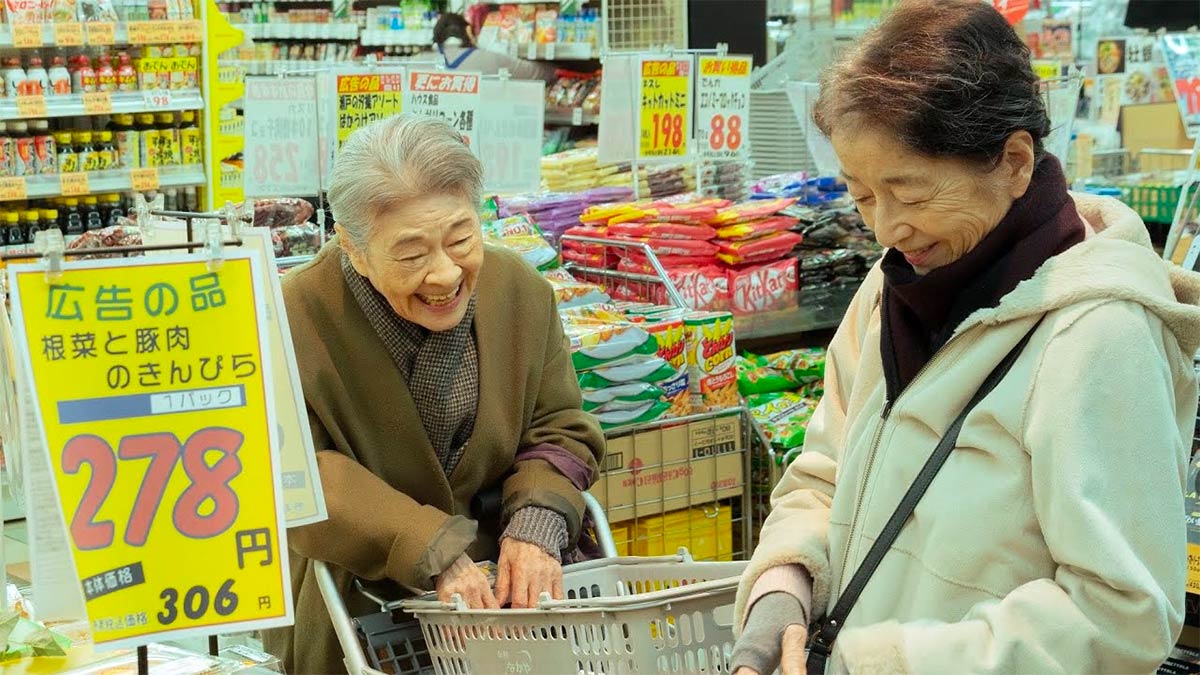A young man reads from a manifesto. He’s just slaughtered countless people in a home for the elderly with an automatic rifle. Just as he finishes explaining that his actions are rooted in helping the elderly sacrifice themselves so they will no longer be a burden on the economy, an announcement is heard over the radio. Legislation has passed to fix Japan’s “aging problem,” and temper hate crimes against the elderly: anyone over the age of seventy-five can apply for government-funded assisted suicide. From this bleak premise, Chie Hayakawa’s beautifully humanist “Plan 75” takes flight.
As Hayakawa’s film unfolds, more details about Plan 75 are revealed, mostly through diegetic radio and television transmissions. What starts as beautiful promises, like $1000 spending money to do whatever you wish and extended spa stays before completing the process to guarantee ceremonial cremation, is slowly revealed to be a more sinister bureaucratic scam, and, eventually a living nightmare.
Caught up in this web are various denizens of different ages and occupations. There’s Maria (Stefanie Arianne), an empathetic Filipina migrant worker who leaves a job in elder care for higher pay working with Plan 75 in order to raise funds for her daughter’s heart surgery. Hiromu (Hayato Isomura), a young clerk who believes his work with Plan 75 is a benevolent social service until his estranged uncle shows up at his desk one day. And at the film’s heart is Michiko (a transcendent Chieko Baishô), a spunky independent senior who turns to Plan 75 as a last option after facing discrimination that causes her to lose both her home and her job.
Baishô is a wonder Michiko, a woman whose life has not gone according to tradition. Widowed from her second marriage, one built from love after escaping a tortuous arranged marriage, she has no family. Thanks to a government more willing to systematically euthanize its elderly, rather than fund social services, she has few options left to support herself, despite a hunger for life. Baishô’s face is full of laugh lines and wrinkles, a story of a life well-lived, with eyes that still shine as bright as they ever did.
The elderly, a Plan 75 manager tells call center trainees, are lonely by nature so their job is to talk to them through their anxiety, make sure they do not opt-out halfway through the process. It’s a chilling scene, one of many that show how fascism can creep into society in many forms. When people are thought of as numbers, as abstract, as a problem to solve, rather than as individuals, as people with a story and a history, it’s easy to look the other way. To just follow orders.
One call center operator, Yoko (Yuumi Kawai), learns just that as she begins to spend time with Michiko. Breaking the rules, the two women go bowling together. Yoko finds a much more vibrant woman than she thought was on the other end of the phone. She knows the rules are in place so she will not get involved emotionally, but is ill-prepared for the impact of those emotions when they arrive. This is how fascism works. You keep people at an emotional distance from each other and again orders will be followed. As Yoko comes to realize her part in this government-sanctioned genocide, Kawau exudes a great horror coupled with immense grief from every inch of her body.
Along with the individuals who comply with the government, director Hayakawa understands that capitalism also works hand in hand with creeping fascism. An announcement says the government plans to lower the age to apply to 65 over the next few years, and that a private industry grossing $10B has arisen around the program. When there’s that much money to be made, it’s no wonder the welfare office is never open. It’s no wonder a man who spent his life building bridges and structures around the country is shunted off to die alone when he is no longer useful.
But Hayakawa’s film is not all melancholy and despair. In following Michiko, Maria, and Hiromu’s journeys, she celebrates life. She celebrates individuality. A love of cream soda and bowling. Of singing karaoke with a group of friends. Of donating blood to help others around the country. Of feeding the hungry soup on a cold night. Hayakawa asks us to remember that a population is made of persons, and they are just like us. If we communicate, share our lives, reach out to those who are isolated and vulnerable, that’s where magic can be found.
Her film doesn’t offer a solution for the government’s systematic genocide of the elderly, but there is a resolution for this handful of characters as they get back in touch with their humanity and the humanity of others. The young bureaucrats get no absolution but must live with the regret of knowing the true cost of their complicity with this program. And Michiko? Her future may not be known, but it’s certain she’ll face it smiling and singing of apple trees while the sun sets over the mountains. [A]





